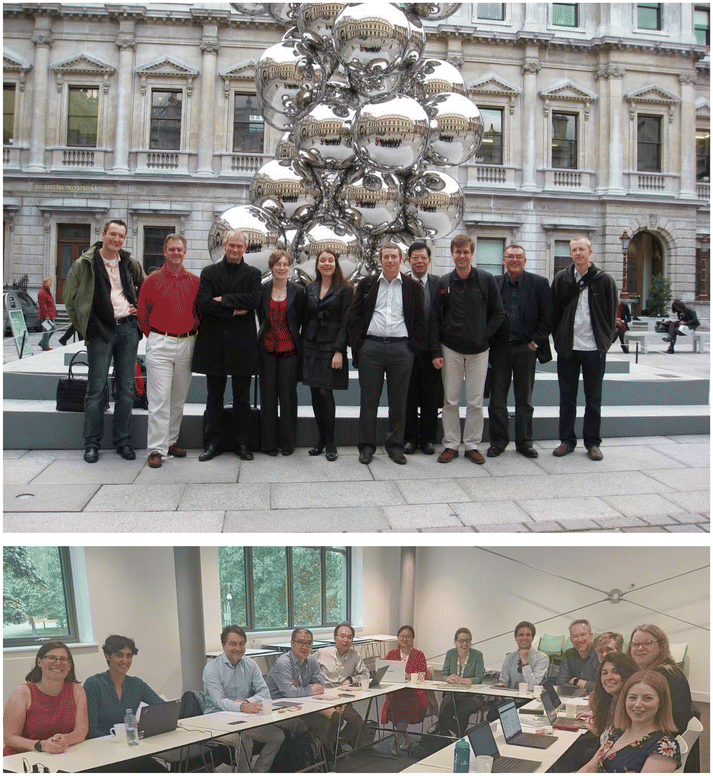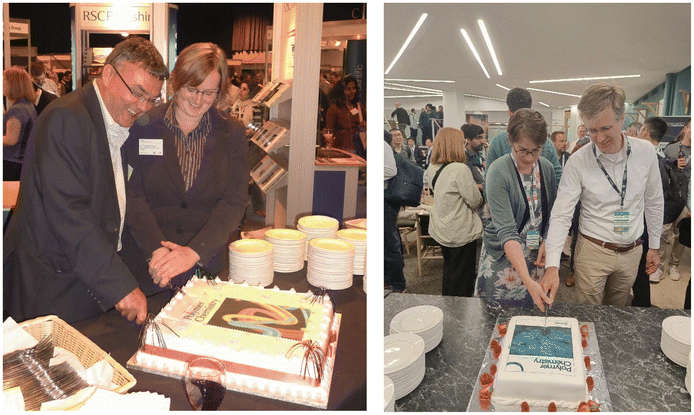Fifteen years of Polymer Chemistry
Christine K.
Luscombe
 *a and
Maria E.
Southall
*a and
Maria E.
Southall
 *b
*b
aPi-Conjugated Polymers Unit, Okinawa Institute of Science and Technology, Okinawa, Japan
bRoyal Society of Chemistry, Thomas Graham House, Science Park, Milton Road, Cambridge, UK. E-mail: polymers-rsc@rsc.org
Polymer Chemistry was created by the polymer community for the polymer community. The original aim was, and remains, to be a home for the best polymer chemistry research, especially from the rising stars of the field. We like to believe that the amazing science published in the journal from across a breadth of researchers reflects this. During the journal's lifetime, the field of polymer chemistry has expanded and grown within the wider chemical sciences community. Polymers are an integral part of everyday life and new chemistries are essential for the innovation required to produce the next-generation materials required to address the many challenges of our changing world. Polymer Chemistry will continue to play a central role in reporting the latest advancements in the development of sustainable and smart polymer materials.
January 2010 saw the very first issue of Polymer Chemistry published and since then we have published almost 9000 articles and reviews from research groups in over 75 countries. David Haddleton (University of Warwick, UK), founding Editor-in-Chief, reflects on the launch of the journal: “We started Polymer Chemistry to give the RSC and the polymer community a high-quality and high-volume journal as an alternative to the well-established journal Macromolecules published by the ACS. We felt the growing importance and impact of polymer chemistry needed a new place with the emphasis on exciting new chemistry and synthesis that was emerging from the growing numbers of superb younger researchers from across the world. We were determined to have a diverse board, authorship and readers that gave equal importance to wherever they worked and whoever they were. We deliberately had a young and vibrant board with little or no experience of publishing and I was blessed with a group of scientists that was so full of ideas and energy that enabled us to quickly increase to a weekly publication and to achieve what we were aiming for with an impact factor that we were proud of, which gave us the trust of our community. The support and freedom of the various RSC editors and staff were incredible as they allowed us to experiment with many different things along our journey where some were successful, and some ideas fell off the cliff! This energy and enthusiasm have continued, and it is now hard to imagine our community without Polymer Chemistry, which continues to innovate and inspire with the new editorial team”.
During David's tenure, Polymer Chemistry moved from a monthly to a weekly publication allowing us to bring you the latest research even more rapidly. The journal also published its first themed collections, showcasing exciting areas of polymer chemistry, alongside the issues highlighting Emerging Investigators in the field.
In 2017, Christopher Barner-Kowollik (Queensland University of Technology, Australia) succeeded David as Editor-in-Chief. With Christopher at the helm, the journal continued to bring the highest quality research to our readers. After several successful Emerging Investigator issues, the journal launched its biennial Pioneering Investigator issue to support mid-career researchers. Our field also saw the 100th anniversary of the seminal 1920 publication “On Polymerisation” by Hermann Staudinger, which was translated into English for the first time in Polymer Chemistry (https://doi.org/10.1039/C9PY90161B) by Associate Editor Holger Frey.
Christopher's reflections on his time on the Polymer Chemistry Editorial Board: “When I joined the journal as one of its inaugural Editorial Board members in 2010, I was very excited that polymer chemistry would have a home at the RSC led by David Haddleton. And what a journey it has been! 15 years on, we have established the journal as one of the most respected venues for reporting the most exciting polymer synthesis and design under the auspices of a learned society. It was a privilege to serve our community for such a long period and an absolute pleasure to work with my colleagues on the board during my time as Editor-in-Chief. In times of an ever more fracturing publishing landscape, it is critical that we as a community support the learned society publishers and continue to place quality and scientific rigor at the forefront of our publishing ethos. I look forward to the continued evolution of the journal and will remain one of its foremost supporters. Happy Birthday Polymer Chemistry and well done RSC!” Christopher has now moved onto a new role as an Associate Editor for Chemical Science.
In October 2024, Christine Luscombe (Okinawa Institute of Science and Technology, Japan) was appointed as Editor-in-Chief. Christine rejoined the RSC after a period as an ACS Associate Editor, having previously acted as an Associate Editor for Journal of Materials Chemistry A. “I am incredibly honoured to be joining Polymer Chemistry at such an exciting milestone. I am extremely fortunate in being able to follow in David and Christopher's footsteps and will aim to continue serving the broader polymer community building on the excellent foundations that have been established. As part of serving the community, I aim to work with other chemical societies in building on FAIR principles for the polymer community, as well as addressing global challenges such as sustainability. I look forward to leading Polymer Chemistry and, with our talented Editorial team, inspiring the future generation of scientists” (Fig. 1).
 | ||
| Fig. 1 2009 Polymer Chemistry Editorial Board meeting (top) and 2024 Polymer Chemistry Editorial Board meeting (bottom). | ||
Supporting the field's rising stars has been a cornerstone of the journal since its inception. Polymer Chemistry has awarded an annual journal lectureship since 2015 to honour an early-stage career scientist who has made a significant contribution to the field of polymer chemistry. The recipient is selected by the Polymer Chemistry Editorial Board from a list of candidates nominated by the community. Details about recent winners and how to nominate can be found on the lectureship website.
Polymer Chemistry has also supported early-career scientists through dedicated themed collections showcasing the work being conducted by early-career researchers in all areas of polymer chemistry across the globe. The journal has run 4 Emerging Investigator issues and more recently we launched the ongoing Emerging Investigator Series. This collection highlights up-and-coming scientists in early stages of their independent careers, who have been identified as having the potential to influence future directions in the field. We welcome all early-career researchers who are eligible for the series to submit their best work to the journal and we hope that the next generation of polymer pioneers will see Polymer Chemistry as a home. Further information on eligibility and how to apply for consideration can be found in our blog.
As a community journal, we strive to highlight exciting and relevant topics alongside innovative researchers in our themed collections. Polymer Chemistry publishes a biennial Pioneering Investigators collection to highlight the great work of mid-career researchers who have established themselves as pioneers in the field and who continue to publish creative and innovative work. Polymer science touches many fields, and to aid in fostering links between communities we aim to unite different researchers in themed collections, such as the recent collection ‘Plastic conversion’ with Catalysis Science & Technology and the joint collection with Soft Matter on ‘Exploring polymer networks: properties, applications, and sustainable solutions’. The new ‘https://rsc.li/py-educational-series’ aims to provide tutorial-style articles covering the fundamentals of polymer chemistry techniques and best practice as an informative and educational resource for all researchers.
In honour of our anniversary, we are delighted to introduce the Polymer Chemistryhttps://rsc.li/PY-15thAnniversary (this collection is free to read until the end of January 2025). This collection features high-quality research and review articles from some of the top authors in polymers; we hope you enjoy reading this very special collection. This series of papers also reflects the diversity of the journal's authorship and we trust that you will enjoy reading these papers and the insights they provide across the breadth of our discipline.
Polymer Chemistry plays an important role as the voice of the community in advocating for change and championing new research. The RSC's purpose is to help the chemical science community make the world a better place and the polymer community has proudly supported RSC policy work on diverse topics including ‘Progressive plastics’, ‘Sustainable composite materials’ and ‘Polymers in liquid formulations’. As a journal we hope to publish more transdisciplinary articles, such as former Editor-in-Chief Christopher Barner-Kowollik's perspective on plastics traceability and governance (https://doi.org/10.1039/D2PY01180H).
The journal has a strong tradition of supporting events and being visible at international polymer conferences. Both the launch of the journal and the 15th anniversary were celebrated at the IUPAC World Polymer Congress, in 2010 and 2024 respectively (Fig. 2). At IUPAC Macro 2024: The 50th World Polymer Congress, both Polymer Chemistry and RSC Applied Polymers held symposia and a joint reception afterwards where, as with the journal launch, cake was involved!
We would like to express our immense gratitude to the entire polymer community who have supported us from the start. The polymer community is indeed a special one and Polymer Chemistry owes its success to everyone who has supported the journal. On behalf of the Editorial Board and the rest of the Editorial Office team, we would like to sincerely thank all who have supported the journal in the past and who continue to support us today. Our authors, reviewers, readers and board members are the backbone of the journal and our community; your support is central to the success of the journal, and we look forward to continuing to engage with you going forward. We will continue to be a journal by the polymer community for the polymer community.
In line with the Royal Society of Chemistry's values of inclusion and diversity, we wish to emphasise that Polymer Chemistry welcomes work from all areas of polymer science that have a strong focus on macromolecular chemistry. High quality is the key determining factor for publishing in Polymer Chemistry and we look forward to your continued contributions to the journal.
This Editorial has provided us with an opportunity to reflect on the achievements of Polymer Chemistry in the last 15 years and we are very proud of what we have built. Now it is time to look to the future and we believe that Polymer Chemistry will continue to be the home of diverse, innovative, and impactful polymer research for many years to come while continuing to adapt and improve so we can better serve the community. We are excited to continue our journey with you!
Professor Christine Luscombe, Editor-in-Chief
Dr Maria Southall, Executive Editor
| This journal is © The Royal Society of Chemistry 2025 |

